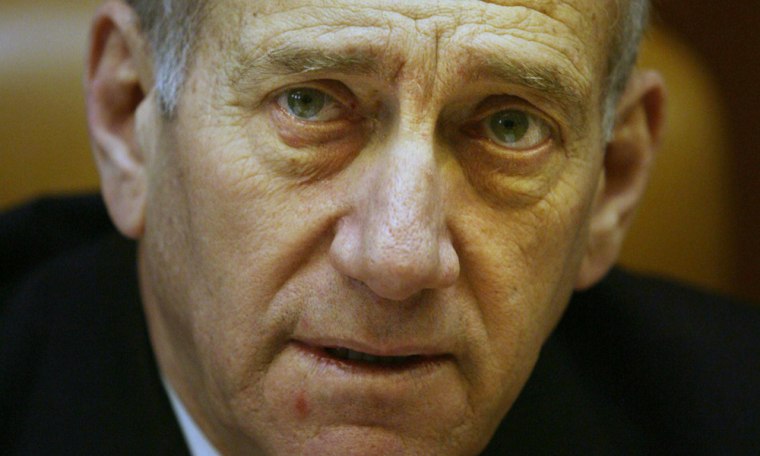Israel has failed to uphold its promise to halt building in settlements, Prime Minister Ehud Olmert said in an unprecedented acknowledgement Friday ahead of President Bush's visit to prod Israel and the Palestinians toward a final accord.
Any agreement is to be based on the internationally backed "road map" peace plan, which was revived ahead of the recent Mideast peace summit in Annapolis, Md., where Israel and the Palestinians officially relaunched talks after seven years of violence.
The road map foundered shortly after it was presented in 2003 because neither side met initial obligations: Israel did not halt West Bank settlement construction, and the Palestinians did not crack down on militants.
Israel has long maintained that it has the right to continue building in existing settlements to account for ill-defined "natural growth" of the existing settler population — something the "road map" explicitly bans. But in his interview with The Jerusalem Post, Olmert acknowledged that Israel was not honoring its commitments.
"There is a certain contradiction in this between what we're actually seeing and what we ourselves promised," Olmert said.
"Obligations are not only to be demanded of others, but they must also be honored by ourselves. So there is a certain problem here," the newspaper quoted him as saying.
Olmert added, however, that Israel believes a Bush letter to the Israeli government in 2004 "renders flexible to a degree what is written in the road map."
Obligations from both sides
In that letter, Bush wrote that "existing Israeli population centers" should be taken into consideration when the final borders of a Palestinian state are set down. Israel takes this to mean it will be able to retain major West Bank settlement blocs, where much of the controversial construction is going on.
Palestinian negotiator Saeb Erekat welcomed Olmert's remarks. When both sides admit they are not carrying out all their obligations, that "should be the way for both of us to carry out our obligations," Erekat said.
Vice Premier Haim Ramon said Friday that Israel might begin dismantling about two dozen unauthorized settlement outposts in the near future — another road map obligation.
"I hope and also believe that in the near future, during the U.S. president's visit to Israel and afterwards, real steps will be taken to remove those outposts," Ramon told Israel Radio.
Outposts and its issues
The outposts are generally tiny settler encampments, meant to expand Jewish presence in the West Bank, which the Palestinians claim as part of a future state, along with east Jerusalem and the Gaza Strip. Israel captured all three territories in the 1967 Mideast war. It immediately annexed east Jerusalem but evacuated Gaza in 2005.
Israel has stepped up efforts to make peace with the moderate Palestinian president, Mahmoud Abbas, ever since the Islamic Hamas routed Abbas' Fatah forces and took over Gaza in June. At Annapolis, both sides set a December 2008 target — the end of Bush's tenure — for a final deal.
Olmert told The Jerusalem Post that a peace agreement might not be reached this year as Bush hopes. But, Bush has not pressured Israel to advance in the negotiations, Olmert said.
Israel has demanded that Abbas clamp down on militants, while carrying out its own operations against extremists in the West Bank and Gaza.
Violence along Gaza border
Two Hamas gunmen were shot and killed by Israeli troops along Gaza's border with Israel before dawn Friday — bringing to 11 the number of Palestinians killed since militants fired a rocket a day earlier on a major Israeli city.
The military struck Gaza with aerial and ground attacks after the Israeli town of Ashkelon was hit Thursday with a rocket that has a deadlier warhead and longer range than those usually fired. Four of the 11 Gazans killed were civilians.
A rocket fired late Friday afternoon struck a house in the southern Israeli town of Sderot. No injuries were immediately reported. A little-known Fatah offshoot, Mujahedeen Brigades, claimed responsibility.
Israel also kept up a military operation in the West Bank town of Nablus that has injured 35 people and kept 150,000 residents confined to their homes under a curfew for three days.
Nablus is Abbas test case
Nablus, a center of militant activity, is a test case of Abbas' ability to impose law and order in the West Bank.
In coordination with Israel, Palestinian security forces have deployed around the city in recent weeks, but Israeli troops unilaterally launched the operation in Nablus on Wednesday after announcing they discovered a militant weapons lab there.
A statement from Prime Minister Salam Fayyad's office on Friday said he considers the Nablus operation "destructive to his government's efforts in the security field."
"These Israeli aggressions have a very negative influence on the efforts to revive the peace process," read the statement.
Israeli government spokesman Mark Regev said the Palestinian security forces were not yet ready to take over full responsibilities in the West Bank.
"At the moment, it is clear that much, much work still has to be done to rebuild and reform Palestinian security," he said.
